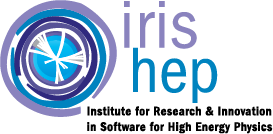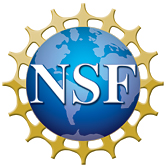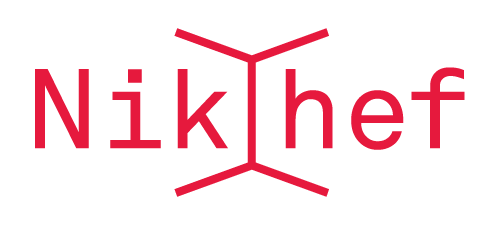PyHEP - Python in HEP
The PyHEP Activity Area brings together a community of developers and users of Python in Particle Physics, with the aim of improving the sharing of knowledge and expertise. It embraces the broad community, from HEP to the Astroparticle and Intensity Frontier communities.
Conveners
- Peter Fackeldey (CMS and IRIS-HEP, Princeton)
- Ianna Osborne (CMS and IRIS-HEP, Princeton)
- Marcel Rieger (CMS, Hamburg University)
All coordinators can be reached at hsf-pyhep-organisation@googlegroups.com.
Getting Involved
Everyone is welcome to join the community and participate, contribute, to the organised meetings and by means of the following communication channels:
- Gitter channel PyHEP for any informal exchanges.
- GitHub repository of resources, e.g., Python libraries of interest to Particle Physics.
- PyHEP Workshop Twitter handle: @PyHEPConf
Extra Gitter channels have been created by and for the benefit of the community:
- PyHEP-newcomers for newcomers support (very low entry threshold).
- PyHEP-fitting for discussions around fitting.
- PyHEP-histogramming for discussions around histogramming.
- mpl-hep for Matplotlib proposals related to Particle Physics.
Group Activities
- PyHEP topical meetings “Python Module of the Month” - agendas. These meetings follow the idea of the Python 3 Module of the Week, but with a spirit adapted to our needs: presentations with a focus on libraries relevant to data analysis in Particle Physics, either from the Data Science domain or HEP domain specific.
- Annual PyHEP workshops, see details below.
The meetings are since 2020 recorded and all videos are available as HSF YouTube playlists.
PyHEP Series of Workshops
The PyHEP workshops are a series of workshops initiated by Eduardo Rodrigues and supported by the HSF with the aim to provide an environment to discuss and promote the usage of Python in the HEP community at large.
| Workshop | Location | Date | Agenda link |
|---|---|---|---|
| PyHEP 2025 | CERN, Hybrid workshop | October 27-30, 2025 | Indico |
| PyHEP 2025.dev | Seattle, WA, USA | July 14-17, 2025 | Indico |
| PyHEP 2024.dev | Aachen, Germany | August 26-30, 2024 | Indico |
| PyHEP 2024 | Online workshop | July 1-4, 2024 | Indico |
| PyHEP 2023 | Online workshop | October 9-12, 2023 | Indico |
| PyHEP 2023.dev | Princeton, NJ, USA | July 25-28, 2023 | Indico |
| PyHEP 2022 | Online workshop | September 12-16, 2022 | Indico |
| PyHEP 2021 | Online workshop | July 5-9, 2021 | Indico |
| PyHEP 2020 | Online workshop | July 13-17, 2020 | Indico |
| PyHEP 2019 | Abingdon, U.K. | October 16-18, 2019 | Indico |
| PyHEP 2018 | Sofia, Bulgaria | July 7-8, 2018 | Indico |
The advert and details on these workshops are given below.
PyHEP 2025 & PyHEP.dev 2025
As in previous years, two events will be held again this year:
PyHEP 2025, on October 27-30, is a continuation of the free workshop series, which has been bringing Python HEP developers and physicists together for several years. PyHEP 2025 will run in a hybrid format for the first time. This edition will welcome participants both virtually and in person at CERN.
PyHEP.dev 2025 is intended for Python HEP software developers and power users to plan a coherent roadmap and make priorities for the upcoming year. It will be held in-person in Seattle, WA (US) on July 14-17. It will include presentations by participants, but the focus will be on birds-of-a-feather style group discussions. Attendance is limited to ~50 participants.
Organising Committee
Matthew Feickert - University of Wisconsin-Madison
Nikolai Krug - LMU Munich
Peter Fackeldey - Princeton University
Ianna Osborne - Princeton University
Marcel Rieger - Hamburg University
Local organisers:
Gordon Watts - University of Washington
Sponsors
One of the, or both, events, is/are kindly sponsored by (details on the Indico pages)

PyHEP 2024 & PyHEP.dev 2024
Two events will again be held this year:
PyHEP 2024, on July 1‒4, is a continuation of the free, online, workshop series, which has been bringing Python HEP developers and physicists together these past years.
PyHEP.dev 2024 is intended for Python HEP software developers to plan a coherent roadmap and make priorities for the upcoming year. It will be held in-person in Aachen (Germany), on August 26‒30. It will include presentations by participants, but the focus will be on birds-of-a-feather style group discussions. Attendance is limited to 50 participants.
Organising Committee
Eduardo Rodrigues - University of Liverpool (Chair)
Graeme A. Stewart - CERN (organiser of PyHEP 2024 solely)
Jim Pivarski - Princeton University
Matthew Feickert - University of Wisconsin-Madison
Nikolai Hartmann - Ludwig-Maximilians-Universität Munich
Local organisers:
Peter Fackeldey - RWTH Aachen University & ErUM-Data-Hub
Angela Warkentin - ErUM-Data-Hub
Sponsors
One of the, or both, events, is/are kindly sponsored by (details on the Indico pages)



PyHEP 2023 & PyHEP.dev 2023
Two events were held in 2023 for the first time:
PyHEP 2023, on October 9‒12, was a continuation of the free, online, workshop series, which has been bringing Python HEP developers and physicists together these past five years.
PyHEP.dev 2023 was new this year, intended for Python HEP software developers to plan a coherent roadmap and make priorities for the upcoming year. It was held in-person at Princeton University, Princeton, New Jersey (USA), on July 25‒28. It included presentations by participants, but the focus was on birds-of-a-feather style group discussions. Attendance was limited to 45 participants.
Organising Committee
Eduardo Rodrigues - University of Liverpool (Chair)
Graeme A. Stewart - CERN
Jim Pivarski - Princeton University
Matthew Feickert - University of Wisconsin-Madison
Nikolai Hartmann - Ludwig-Maximilians-Universität Munich (organiser of PyHEP 2023 solely)
Oksana Shadura - University of Nebraska-Lincoln
Sponsors
One of the, or both, events, was/were kindly sponsored by (details on the Indico pages)




PyHEP 2022
PyHEP 2022 was held as a virtual workshop on 12-16 September 2022. The workshop was a forum for the participants and the community at large to discuss developments of Python packages and tools, exchange experiences, and inform the future evolution of community activities. There was ample time for discussion.
PyHEP 2022 agenda was composed of plenary sessions such as for example:
- Topical sessions
- Hands-on tutorials and lightning talks
- Presentations following up from topics discussed at PyHEP 2021
Organising Committee
Eduardo Rodrigues - University of Liverpool (Chair)
Graeme A. Stewart - CERN
Jim Pivarski - Princeton University
Matthew Feickert - University of Wisconsin-Madison
Nikolai Hartmann - Ludwig-Maximilians-Universität Munich
Oksana Shadura - University of Nebraska-Lincoln
Sponsors
The event was kindly sponsored by



PyHEP 2021
PyHEP 2021 was held as a virtual workshop on 5-9 July 2021. The workshop was a forum for the participants and the community at large to discuss developments of Python packages and tools, exchange experiences, and inform the future evolution of community activities. There was ample time for discussion.
PyHEP 2021 agenda was composed of plenary sessions such as for example:
- Topical sessions
- Hands-on tutorials and lightning talks
- Presentations following up from topics discussed at PyHEP 2020
Organising Committee
Eduardo Rodrigues - University of Liverpool (Chair)
Ben Krikler - University of Bristol (Co-chair)
Jim Pivarski - Princeton University (Co-chair)
Matthew Feickert - University of Illinois at Urbana-Champaign
Oksana Shadura - University of Nebraska-Lincoln
Philip Grace - The University of Adelaide
Sponsors
The event was kindly sponsored by




PyHEP 2020
PyHEP 2020 was held as a virtual workshop on 13-17 July 2020. The workshop was meant to take place in the same city as the SciPy 2020 conference on scientific computing in Python, and slightly overlap in time with it, to facilitate inter-community exchanges. Both events ran as virtual events because of the worldwide COVID-19 pandemic.
PyHEP 2020 agenda was composed of plenary sessions such as for example:
- Topical sessions
- Hands-on tutorials
- Two keynote presentations (phenomenology and astroparticle physics communities)
- Presentations following up from topics discussed at PyHEP 2019
Organising Committee
Eduardo Rodrigues - University of Cincinnati (Chair)
Ben Krikler - University of Bristol (Co-chair)
Jim Pivarski - Princeton University (Co-chair)
Matthew Feickert - University of Illinois at Urbana-Champaign
Local organisation
Chris Tunnell - Rice University
Peter Onyisi - The University of Texas at Austin
Sponsors
The event was kindly sponsored by





PyHEP 2019
PyHEP 2019 was held at The Cosener’s House, in Abingdon, near Oxford, United Kingdom, on 16-18 October 2019. The workshop was a forum for the participants and the community at large to discuss developments of Python packages and tools, exchange experiences, and steer where the community needs and wants to go. There was ample time for discussion.
A keynote presentation on the PyViz project, open source visualization tools for Python, was given by Philipp Rudiger.
The agenda was composed of plenary sessions such as for example:
- Lightning talks from participants
- Presentations following up from topics discussed at PyHEP 2018
- Topical sessions on e.g. histogramming and statistics, including a talk and a hands-on tutorial
Organising Committee
Eduardo Rodrigues - University of Cincinnati (Chair)
Ben Krikler - University of Bristol (Co-chair)
Sponsors
The event was kindly sponsored by




PyHEP 2018
The first workshop, PyHEP 2018, was held as a pre-CHEP event in Sofia, Bulgaria, on 7-8 July 2018, just before the start of the CHEP 2018 conference. It focused on a review of where and how Python is used in our community, and what the future will hold. The workshop was a forum for the participants, representatives of the community, to discuss topics around the areas of work identified in the HSF Community White Paper. There was ample time for discussion.
A keynote presentation on JupyterLab was given by Vidar Tonaas Fauske.
The agenda was composed of plenary sessions dedicated to the following topics:
- Historical perspective and overview
- PyROOT and Python bindings
- HEP python software ecosystem
- Distribution and installation
- Analysis frameworks
- Python 2 and 3
- Open discussion on education and training
There were no training sessions nor hackathons in this first workshop, but some level of tuition came in small bites in the various presentations, which tried to be educative, not just informative, with well-defined examples relevant to the topics under discussion. One of the goals of this PyHEP workshop was the identification of training workshops or hackathons the community would like to have in the future.
Organising Committee
Eduardo Rodrigues - University of Cincinnati (Chair)
Graeme Stewart - CERN-HSF
Jeff Templon - Nikhef (Co-chair)
Sponsors
The event was kindly sponsored by


Previous conveners
- Nikolai Krug (ATLAS and Belle II, LMU Munich), 2023-2025
- Matthew Feickert (ATLAS and IRIS-HEP, University of Wisconsin-Madison), 2023-2025
- Jim Pivarski (CMS and IRIS-HEP, Princeton), 2019-2024
- Eduardo Rodrigues (LHCb, University of Liverpool), 2018-2024
- Oksana Shadura (IRIS-HEP, University of Nebraska), 2022-2023
- Ben Krikler (LZ, CMS), 2019-2021
- Chris Tunnell (XENON1T), 2019
- Graeme Stewart (CERN EP-SFT), 2018